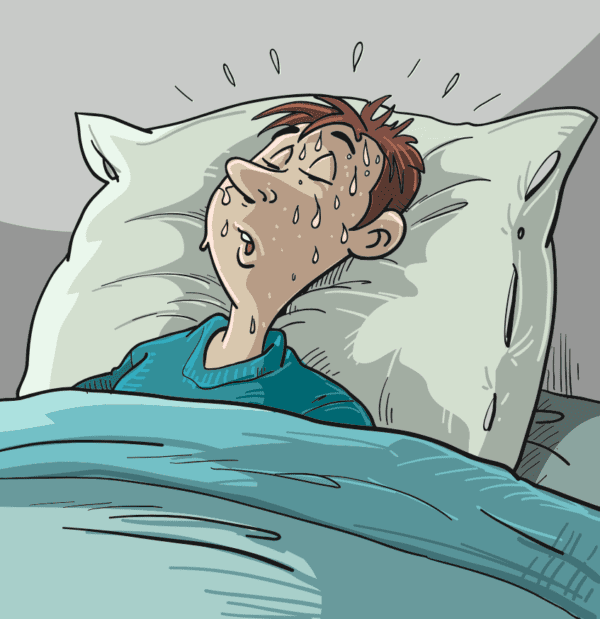Night sweats: Causes and Solutions
Do you sometimes wake up bathed in sweat? You've been sweating so much that even your sheets and nightwear are wet and you're shivering all over from the cold. Night sweats, it's a common complaint in both men and women. But what causes it and what can you do about excessive sweating at night?
What is Night Sweat?
Why do we sweat in the first place? Wouldn't the world be a much nicer place without the annoying moisture loss that creates armpit ponds on your clothing all the time? On the contrary, sweating is very important. Perspiration cools your body and prevents it from overheating.
Unlike simply sweating a little, night sweats are actually a nuisance. You wake up at night, wet and cold with sweat. Sometimes sweat attacks are so bad that you have to change your bedding and nightwear immediately. Sweating in your sleep has several causes. Most are harmless, but there are causes that point to a deeper problem.
The Causes of Sweating in Bed
-
Warm Environment: If you suffer from night sweats, one of the possible causes is an environment that is too warm. Perhaps your bedding is too warm, your mattress and protector does not ventilate enough or your heater is on too high. Sweat has difficulty evaporating in bed, keeping the sweat glands active. In this case, you usually wake up in the middle of the night from the heat.
-
Nightwear: Most likely, you don't wear your winter pajamas in the summer. Still feel too hot? Then maybe it's because of the fabric your nightwear is made of. This is because if you wear synthetic fabrics to sleep, you will sweat faster in your sleep.
-
Physical exertion: Do you exercise or like to get some exercise after work to clear your head? Good idea, but it's best not to do that right before sleeping. When you're active, your body heats up and doesn't cool down right away. As a result, you will sweat heavily in bed.
-
Food: Beware of spicy foods and alcohol. These foods and drinks can cause night sweats. Alcohol dilates blood vessels, releasing heat. The result? Excessive sweating. In food, the substance capsaicin is a particular culprit. You find it in chili pepper, among other things. Capsaicin excites nerve endings and cerebral blood vessels, causing the body to heat up.
-
Medications: Sweating at night is also a common side effect of certain medications. Take a look at the package inserts. Some medications known to have this side effect are Aspirin, Paracetamol, The Pill, antidepressants, Viagra, insulin, Predison and prednisolone.
-
Anxiety and Stress: Feelings of anxiety and stress also affect the sweat glands. This is because adrenaline is produced, which increases heart rate and blood pressure. Energy is released, making you feel warmer and thus sweat faster.
-
Hormones: Women in transition to menopause often suffer from night sweats. They suffer quite a lot from hot flashes or vapors. Then they suddenly get very hot, their heads turn red and the sweat droplets really flow down their bodies.
-
Underlying Disease: Sweating in bed can also be a symptom of an underlying disease such as sleep apnea, diabetes, tuberculosis, HIV virus, pituitary disorders, Hodgkin's disease, adrenal gland disorder.
Solutions for Night Sweats
Waking up in the middle of the night wet with sweat and shivering from the cold is anything but pleasant. But what can you do about it? To reduce moisture production, you can use the following tips:
- After exercise, make sure your body cools down enough. Your body needs an average of four hours to cool down for a healthy night's sleep without excessive sweating.
- Put on fresh, cotton nightwear and choose cotton bedding. Synthetic sheets and pillowcases are anything but breathable. In winter, they retain heat, but in summer, you can hardly breathe in them. As a result, you start sweating noticeably faster. Cotton, linen and silk bed textiles are a good alternative.
- If you want to prevent a clammy mattress, you will benefit from a temperature-regulating protector. Thanks to its moisture-regulating effect, it absorbs your perspiration and discharges it immediately.
- Make sure the temperature is comfortable. If your bedroom is too hot or too cold, it can thoroughly disturb your sleep.
- Avoid alcohol and spicy foods in the evening.
- Is the sweat still running down your body? Then drink a little cold water, rinse off with lukewarm water and place a clean bath towel over your sheet.
In short
So night sweats can have several causes, such as an overly warm environment or nightwear, physical exertion, diet, medications, hormone fluctuations or and underlying disease. Although most are harmless



























0 Comments
There are no comments yet, be the first one to comment....